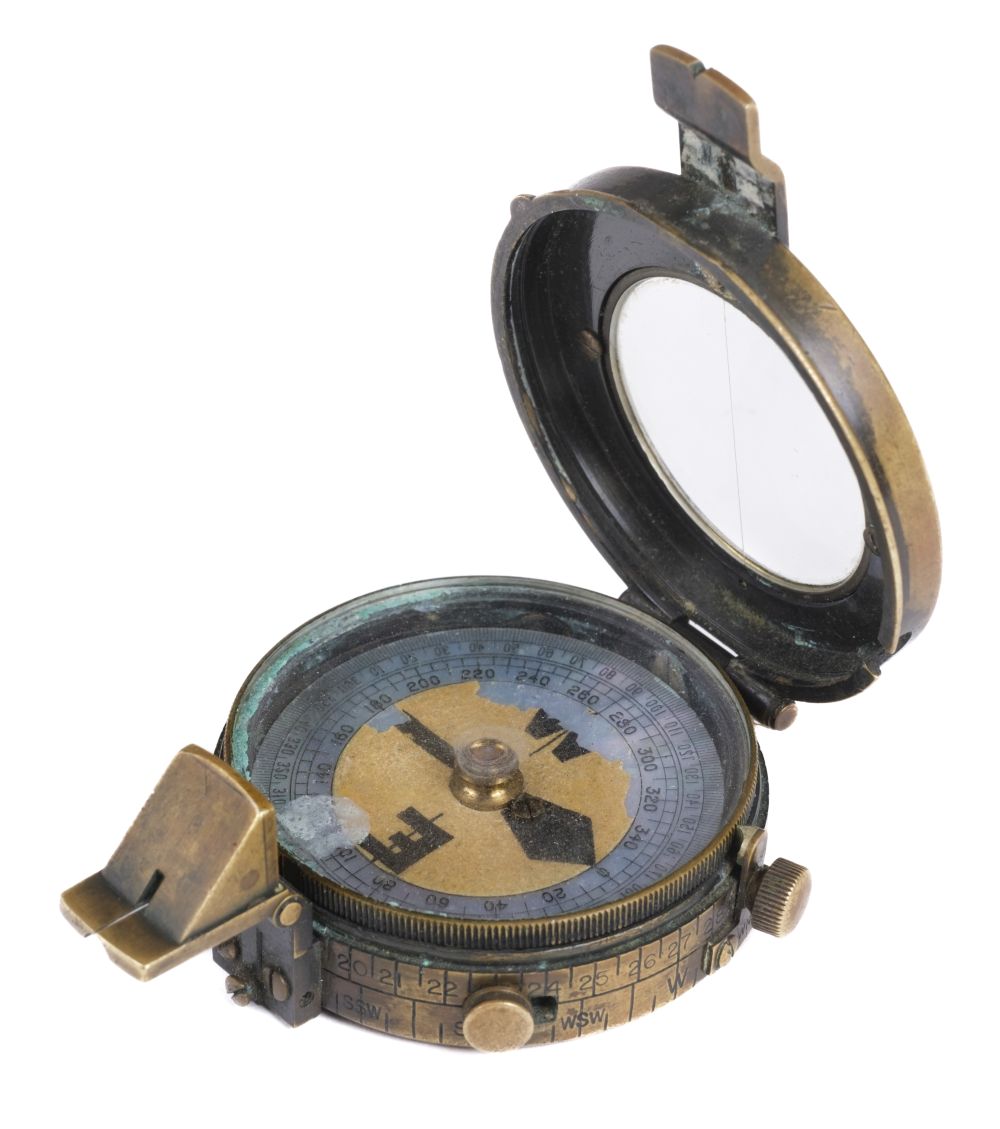LAWRENCE, Thomas Edward--Robert von Ranke GRAVES (1895-1985). Autograph letter signed ('Robert Graves') to T.E. Lawrence, The World's End [Islip, Oxfordshire], n.d. [c.3-5 February 1922, vide infra ], 4 pages, 4° (lightly browned and with a few small marks, short splits on folds). Provenance : sale, Sotheby's London, 24 July 1995, lot 288. AN IMPORTANT LETTER FROM GRAVES TO LAWRENCE, DISCUSSING 'TO S.A.' (THE DEDICATORY POEM OF SEVEN PILLARS OF WISDOM ) -- 'THE POEM IS NEITHER PROSE NOR VERSE, BUT POETIC QUARTZ IN WHICH VEINS OF METAL RUN' -- AND THE EMOTIONAL AND PSYCHOLOGICAL CONSEQUENCES OF THE RAPE AT DERAA, AND INCLUDING GRAVES' POEMS 'THE CRUSADER, ON HIS DEAD MISTRESS' AND 'THE CHILDREN OF DARKNESS' Graves's letter was written in response to one from Lawrence (which enclosed a copy of 'To S.A.'), following a meeting a few days earlier: 'Lord, What I told you last week about my likes was not altogether true. There was an exception who provided a disproportionate share of the motive for the Arabian adventure, and who after it was over dictated the enclosed as preface to the story of it. I turned it out a day ago [...]: and I don't know--It's hardly a literary question of good or bad [...] but is it prose or verse?' (R. Graves and L. Hart T.E. Lawrence to his Biographers (London: 1963), I, p.16). Graves opens his reply with an expression of sympathy for Lawrence's emotional and psychological state: 'Prince, but as it seems of a salty and desolate kingdom, Prince, you terrify me that such things can silently happen to princes and the world go wobbling contentedly on, & other princes continue to drink each others healths, as if all was well & nemesis had ended with the reign of Croesus'. As Martin Seymour-Smith comments on this passage, 'When T.E. Lawrence left Arabia in December 1921, he became depressed, sleepless and temporarily poverty-stricken. Whenever they met, and in correspondence, the two men discussed the problems of sexual desire. Lawrence told Graves as much as he told anybody about the famous Der'a incident: that he had been flogged, beaten up and sodomized' ( Robert Graves (London: 1995), p.101). The letter then turns to Lawrence's question about 'To S.A.', describing it as 'neither prose nor verse, but poetic quartz in which veins of metal run', and qualifying this judgement with definitions of prose (criteria 'To S.A.' does not meet, although 'you tempt and disappoint with blank-verse promises') and verse (which equally it is not, since 'the ear must be kept under control the whole time'). Graves then returns to the impact that Lawrence's letter and the poem have had on him, an impact articulated in the poem 'The Crusader, on his dead Mistress' -- 'I was so upset by your letter & the poem that I found myself looking at it as if it had been dictated to me [...] and I don't know if you'll forgive my childishness in sending you what occurred, but I did it to banish my own terrors'. After considering his possible reaction to a similar change of 'self imposed hunger, sleeplessness & avoidance of women' in his wife Nancy ('whatever nonsense I talk now for fear of Nemesis'), Graves then discusses the impending birth of his daughter Catherine and his financial affairs, which have been much improved by Lawrence's generosity: 'but for your £200 & £50, we could not have escaped a complete smash; & you are therefore already a more-than-godfather to the baby due today or tomorrow' (Catherine Graves was born on 4 February 1922, indicating a date of 3-5 February 1922 for the letter). Following a fiat to 'read Isaiah 29 with intelligence' and a list of aspects of the chapter to consider and comment upon, Graves returns once more to their previous conversation: 'When biking to All Soul's last week I had started a poem which your last words in the College about the futility of Being finished; & also your remarks about parental difficulties, I suppose', before transcribing an early, untitled version of 'Children of Darknes
LAWRENCE, Thomas Edward--Robert von Ranke GRAVES (1895-1985). Autograph letter signed ('Robert Graves') to T.E. Lawrence, The World's End [Islip, Oxfordshire], n.d. [c.3-5 February 1922, vide infra ], 4 pages, 4° (lightly browned and with a few small marks, short splits on folds). Provenance : sale, Sotheby's London, 24 July 1995, lot 288. AN IMPORTANT LETTER FROM GRAVES TO LAWRENCE, DISCUSSING 'TO S.A.' (THE DEDICATORY POEM OF SEVEN PILLARS OF WISDOM ) -- 'THE POEM IS NEITHER PROSE NOR VERSE, BUT POETIC QUARTZ IN WHICH VEINS OF METAL RUN' -- AND THE EMOTIONAL AND PSYCHOLOGICAL CONSEQUENCES OF THE RAPE AT DERAA, AND INCLUDING GRAVES' POEMS 'THE CRUSADER, ON HIS DEAD MISTRESS' AND 'THE CHILDREN OF DARKNESS' Graves's letter was written in response to one from Lawrence (which enclosed a copy of 'To S.A.'), following a meeting a few days earlier: 'Lord, What I told you last week about my likes was not altogether true. There was an exception who provided a disproportionate share of the motive for the Arabian adventure, and who after it was over dictated the enclosed as preface to the story of it. I turned it out a day ago [...]: and I don't know--It's hardly a literary question of good or bad [...] but is it prose or verse?' (R. Graves and L. Hart T.E. Lawrence to his Biographers (London: 1963), I, p.16). Graves opens his reply with an expression of sympathy for Lawrence's emotional and psychological state: 'Prince, but as it seems of a salty and desolate kingdom, Prince, you terrify me that such things can silently happen to princes and the world go wobbling contentedly on, & other princes continue to drink each others healths, as if all was well & nemesis had ended with the reign of Croesus'. As Martin Seymour-Smith comments on this passage, 'When T.E. Lawrence left Arabia in December 1921, he became depressed, sleepless and temporarily poverty-stricken. Whenever they met, and in correspondence, the two men discussed the problems of sexual desire. Lawrence told Graves as much as he told anybody about the famous Der'a incident: that he had been flogged, beaten up and sodomized' ( Robert Graves (London: 1995), p.101). The letter then turns to Lawrence's question about 'To S.A.', describing it as 'neither prose nor verse, but poetic quartz in which veins of metal run', and qualifying this judgement with definitions of prose (criteria 'To S.A.' does not meet, although 'you tempt and disappoint with blank-verse promises') and verse (which equally it is not, since 'the ear must be kept under control the whole time'). Graves then returns to the impact that Lawrence's letter and the poem have had on him, an impact articulated in the poem 'The Crusader, on his dead Mistress' -- 'I was so upset by your letter & the poem that I found myself looking at it as if it had been dictated to me [...] and I don't know if you'll forgive my childishness in sending you what occurred, but I did it to banish my own terrors'. After considering his possible reaction to a similar change of 'self imposed hunger, sleeplessness & avoidance of women' in his wife Nancy ('whatever nonsense I talk now for fear of Nemesis'), Graves then discusses the impending birth of his daughter Catherine and his financial affairs, which have been much improved by Lawrence's generosity: 'but for your £200 & £50, we could not have escaped a complete smash; & you are therefore already a more-than-godfather to the baby due today or tomorrow' (Catherine Graves was born on 4 February 1922, indicating a date of 3-5 February 1922 for the letter). Following a fiat to 'read Isaiah 29 with intelligence' and a list of aspects of the chapter to consider and comment upon, Graves returns once more to their previous conversation: 'When biking to All Soul's last week I had started a poem which your last words in the College about the futility of Being finished; & also your remarks about parental difficulties, I suppose', before transcribing an early, untitled version of 'Children of Darknes















Try LotSearch and its premium features for 7 days - without any costs!
Be notified automatically about new items in upcoming auctions.
Create an alert